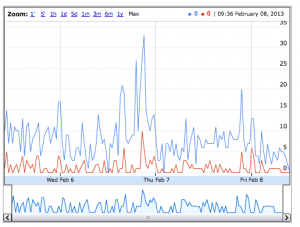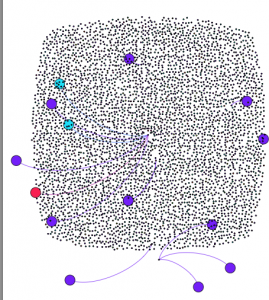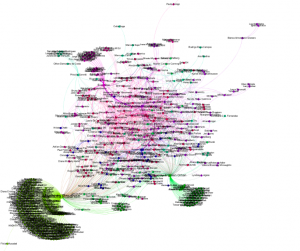Following on from last week’s post on the #edcmooc, the course itself has turned to explore the notion of MOOCs in the context of utopian/dystopian views of technology and education. The questions I raised in the post are still running through my mind. However they were at a much more holistic than personal level.
This week, I’ve been really trying to think about things from my student (or learner) point of view. Are MOOCs really changing the way I engage with formal education systems? On the one hand yes, as they are allowing me (and thousands of others) to get a taste of courses from well established institutions. At a very surface level who doesn’t want to say they’ve studied at MIT/Stanford/Edinburgh? As I said last week, there’s no fee so less pressure in one sense to explore new areas and if they don’t suit you, there’s no issue in dropping out – well not for the student at this stage anyway. Perhaps in the future, through various analytical methods, serial drop outs will be recognised by “the system” and not be allowed to join courses, or have to start paying to be allowed in.
But on the other hand, is what I’m actually doing really different than what I did at school and when I was an undergraduate or was a student on “traditional’ on line, distance courses. Well no, not really. I’m reading selected papers and articles, watching videos, contributing to discussion forums – nothing I’ve not done before, or presented to me in a way that I’ve not seen before. The “go to class” button on the Coursera site does make me giggle tho’ as it’s just soo American and every time I see it I hear a disembodied American voice. But I digress.
The element of peer review for the final assignment for #edcmooc is something I’ve not done as a student, but it’s not a new concept to me. Despite more information on the site and from the team this week I’m still not sure how this will actually work, and if I’ll get my certificate of completion for just posting something online or if there is a minimum number of reviews I need to get. Like many other fellow students the final assessment is something we have been concerned about from day 1, which seemed to come as a surprise to some of the course team. During the end of week 1 google hang out, the team did try to reassure people, but surely they must have expected that we were going to go look at week 5 and “final assessment” almost before anything else? Students are very pragmatic, if there’s an assessment we want to know as soon as possible the where,when, what, why, who,how, as soon as possible. That’s how we’ve been trained (and I use that word very deliberately). Like thousands of others, my whole education career from primary school onwards centred around final grades and exams – so I want to know as much as I can so I know what to do so I can pass and get that certificate.
That overriding response to any kind of assessment can very easily over-ride any of the other softer (but just as worthy) reasons for participation and over-ride the potential of social media to connect and share on an unprecedented level.
As I’ve been reading and watching more dystopian than utopian material, and observing the general MOOC debate taking another turn with the pulling of the Georgia Tech course, I’ve been thinking a lot of the whole experimental nature of MOOCs. We are all just part of a huge experiment just now, students and course teams alike. But we’re not putting very many new elements into the mix, and our pre-determined behaviours are driving our activity. We are in a sense all just ghosts in the machine. When we do try and do something different then participation can drop dramatically. I know that I, and lots of my fellow students on #oldsmooc have struggled to actually complete project based activities.
The community element of MOOCs can be fascinating, and the use of social network analysis can help to give some insights into activity, patterns of behaviour and connections. But with so many people on a course is it really possible to make and sustain meaningful connections? From a selfish point of view, having my blog picked up by the #edcmooc news feed has greatly increased my readership and more importantly I’m getting comments which is more meaningful to me than hits. I’ve tried read other posts too, but in the first week it was really difficult to keep up, so I’ve fallen back to a very pragmatic, reciprocal approach. But with so much going on you need to have strategies to cope, and there is quite a bit of activity around developing a MOOC survival kit which has come from fellow students.
As the course develops the initial euphoria and social web activity may well be slowing down. Looking at the twitter activity it does look like it is on a downwards trend.

#edcmooc Twitter activity diagram
Monitoring this level of activity is still a challenge for the course team and students alike. This morning my colleague Martin Hawskey and I were talking about this, and speculating that maybe there are valuable lessons we in the education sector can learn from the commercial sector about managing “massive” online campaigns. Martin has also done a huge amount of work aggregating data and I’d recommend looking at his blogs. This post is a good starting point.
Listening to the google hang out session run by the #edcmooc team they again seemed to have under estimated the time sink reality of having 41,000 students in a course. Despite being upfront about not being everywhere, the temptation to look must be overwhelming. This was also echoed in the first couple of weeks of #oldsmooc. Interestingly this week there are teaching assistants and students from the MSc course actively involved in the #edcmooc.
I’ve also been having a play with the data from the Facebook group. I’ve had a bit of interaction there, but not a lot. So despite it being a huge group I don’t get the impression, that apart from posting links to blogs for newsfeed, there is a lot of activity or connections. Which seems to be reflected in the graphs created from the data.

#edc Facebook group friends connections
This is a view based on friends connections. NB it was very difficult for a data novice like me to get any meaningful view of this group, but I hope that this gives the impression of the massive number of people and relative lack of connections.
There are a few more connections which can be drawn from the interactions data, and my colleagye David Sherlock manage create a view where some clusters are emerging – but with such a huge group it is difficult to read that much into the visualisation – apart from the fact that there are lots of nodes (people).

#edcmooc Facebook group interactions
I don’t think any of this is unique to #edcmooc. We’re all just learning how to design/run and participate at this level. Technology is allowing us to connect and share at a scale unimaginable even 10 years ago, if we have access to it. NB there was a very interesting comment on my blog about us all being digital slaves.
Despite the potential affordances of access at scale it seems to me we are increasingly just perpetuating an existing system if we don’t take more time to understand the context and consequences of our online connections and communities. I don’t need to connect with 40,000 people but I do want to understand more about how, why and how I could/do. That would be a really new element to add to any course, not just MOOCs (and not something that’s just left to a course specifically about analytics). Unless that happens my primary driver will be that “completion certificate”. In this instance, and many others, to get that I don’t really need to make use of the course community. So I’m just perpetuating an existing where I know how to play the game, even if it’s appearance is somewhat disguised.
Another great, thoughtful post, Sheila. I’ve been hovering around the twittersphere mainly in this course so far rather than actively in the discussion fora for a short while. Have been ill this week so fell back a bit, but it’s interesting to see people’s opinions and perspectives and what’s clear from twitter at any rate is that there’s a wide diversity of people taking the programme in terms of levels of experience of MOOCs, etc, though there is a distinct group of learning tech/development professionals.
A question I have is about the use of MOOCs to teach something other than MOOCs and their implications! It seems to always develop as a discussion topic even on courses ostensibly on statistics, history, etc.
As for the assignment/credit. I’m not sure. I’d like to complete this MOOC certainly, but it’s a busy time and I suspect that’s true of many participants. The excitement and accessibility of MOOCs and other forms of online learning can sometimes obscure the fact that if these are really meant to be ‘courses’ then that means we have to put in effort as students and that means carving out a time commitment and not just surfing along. One of the issues then is for MOOC designers to come up with an appreciation of , and to notify learners about, just how much time needs to be spent on each topic and to seriously examine how realistic an expectation that might be for their intended target population. Of course, from experience in distance learning and learning design, there are ways of doing this, but many other MOOCs seem to have not given this much real consideration and simply bludgeon their way through lecture after lecture.
That’s another strength of #edcmooc I guess. The material is all up front, and it is clear that the ‘workload’ needn’t be too onerous, depending on how much effort you are prepared to put into the assignment and discussion components.
Thanks for the comment Iain. And yes it does all get a bit meta doesn’t it. I guess I just can’t help myself, but I do think we need to share our thoughts as part of the experiment.
Sheila
Pingback: EDCMOOC: Utopia, as x approaches c
Hi there,
Since joining this MOOC I’ve learnt the basics of using TAGS and have used it each week for the chats. I was wondering how you were able to analyse the Facebook group? Is a similar technique used? Are you able to share your secrets? I would love to be able to learn how to use such software.
Thanks for the blog, I much enjoyed your post.
Hi Andy
Of course I can share how I did it. I basically used a free software package called Gephi and followed this tutorial from Tony Hirsthttp://blog.ouseful.info/2011/07/07/visualising-twitter-friend-connections-using-gephi-an-example-using-wireduk-friends-network/.
If you are in the mooc facebook group it is very simple as you have access to the data. Just install this app
https://apps.facebook.com/netvizz/ – and download the file and put that into Gephi then follow the tutorial. Make sure you get a .gdf file. You can choose the type of data either friends or interactions. The MOOC group is very big so you might want to start with your own personal network first. I’m very much a novice at this and it is a bit trial and error but Tony’s blog is a great resource too.
Sheila
Hi Sheila,
I’ve been involving myself in the various MOOC initiatives since Stephen Downes, George Siemens and Dave Cormier began propogating the concept. I’ve just completed the edcmooc exercise and will be continuing with the Harvard course on ‘The Ancient Greek Hero’ next week.
What do I think? Well, not a lot so far. I found the edcmooc exercise mildly thought provoking but limited as a learning experience and deeply entrenched in conventional pedagogy and use of resources. I got the impression that it was one of these scenarios where everyone vaguely thinks that it is a good idea, but in practice it just blunders around randomly bumping into elements of learning effectiveness largely by chance.
I shall persevere, however.I firmly believe in the future globalisation of learning through the internet, but only after we have cast off those enduring shackles of institutional education (…!)
Anyway, hope to see you at the Cetis conference next week.
Hi Tony
Thanks for commenting. I think part of the problem is managing expectations. A lot of the hype leads to preconceptions of doing something really new but to many it isn’t – particularly us ed techies However lots of the communication side of things in particular (twitter, google+ etc) is really new to people as is using it as an integral part of their learning.
However lots of the communication side of things in particular (twitter, google+ etc) is really new to people as is using it as an integral part of their learning.
But there is a lot of work around digital literacy, ple’s and portofolios which needs some serious thought.
Looking forward to catching up next week
Sheila